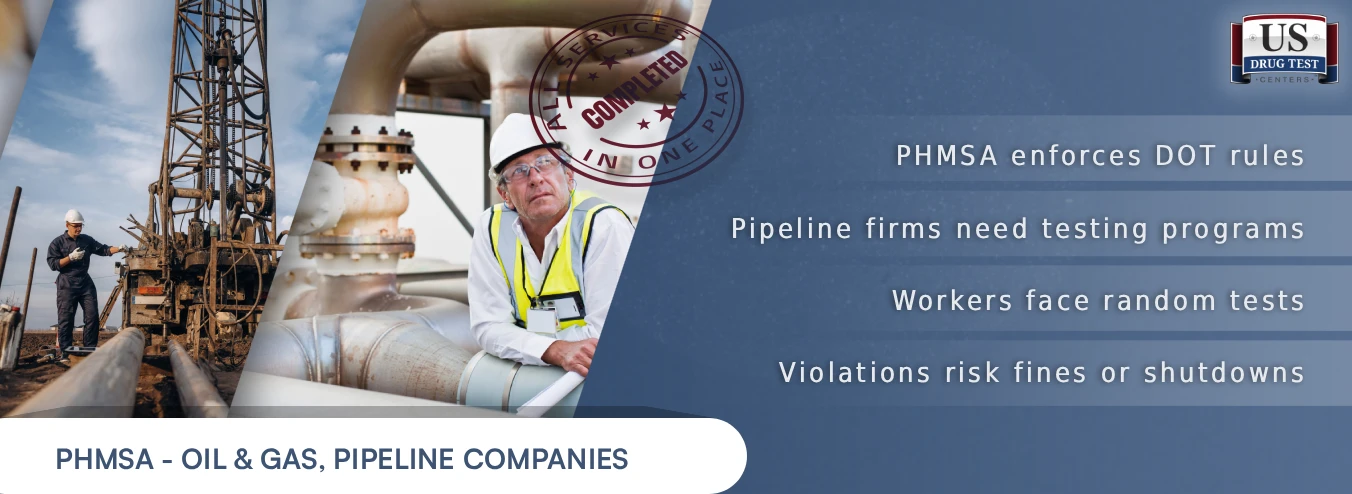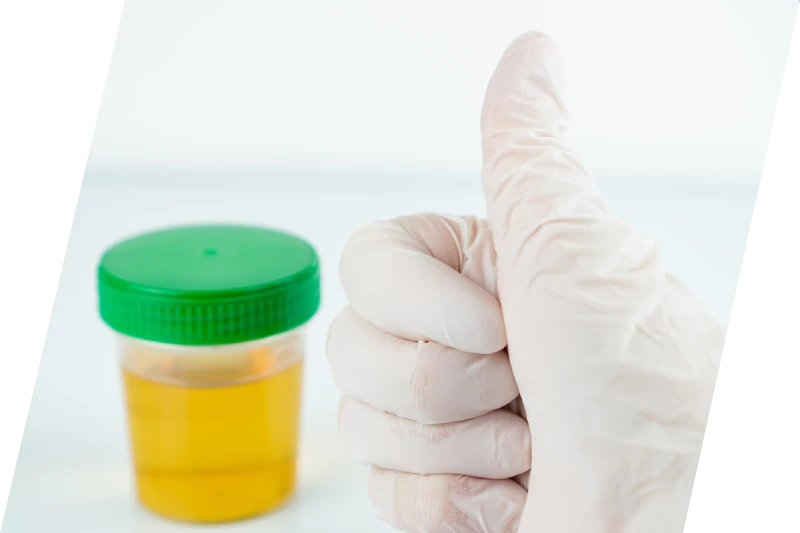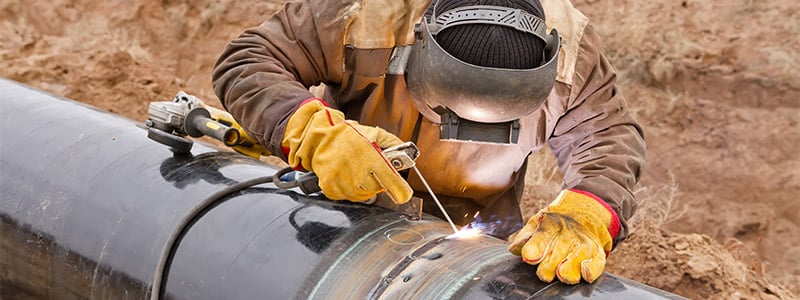
Last Updated: December 14, 2023
The Pipeline and Hazardous Materials Safety Administration (PHMSA) has a mission to protect people and the environment by advancing the safe transportation of energy and other hazardous materials that are essential to our daily lives. This industry includes operators of gas, carbon dioxide pipelines, hazardous liquids, and liquified natural gas facilities. These employees are often working in dangerous surroundings, making drug abuse on the job even more concerning.
Considering prescription drug abuse in America along with changing cannabis laws, maintaining a drug-free workplace is paramount.

The PHMSA operates in a dynamic and challenging environment. The scope and complexity of the PHMSA’s safety mission will continue to grow, requiring that they fundamentally rethink how they will use data, information, and technology to achieve their safety goals.
The PHMSA takes impairment very seriously. In fact, in 2017, they announced that 2018 would see an increase in the number of employees they drug test at random — from 25% to 50% of all covered employees. A covered employee is a person who performs on a pipeline or liquefied natural gas (LNG) facility in an operation, maintenance, or emergency-response function.
This is on top of the changes to the Department of Transportation (DOT) drug testing, since the PHMSA is part of the DOT. One of the latest changes to DOT pipeline drug testing is a new panel that includes prescription opioids, in addition to illegal ones — a wise move, considering this country’s startling opioid epidemic that seems to only get worse.
Enrolling in a pipeline testing consortium for a PHMSA drug test that thoroughly understands the industry is crucial.
The DOT PHMSA drug and alcohol testing regulations require operators, and their contractors, of natural gas and other gas pipeline transportation, hazardous liquids pipeline transportation, and liquefied natural gas (LNG) pipeline facilities to:
Employers regulated by PHMSA must follow DOT drug and alcohol testing rules 49 CFR Part 40 and must also follow the specific PHMSA agency rule 49 CFR Part 199. (See boxes below for more information.) US Drug Test Centers makes available services for complete compliance with CFR Part 40 and Part 199. As a pipeline testing consortium, we’ll help you strictly adhere to DOT’s requirements for PHMSA drug testing.
If you're ready to take the next step with PHMSA drug and alcohol testing, call 866-566-0261 or order your test online!
Employees can be tested before securing employment, after they’ve had an accident, if there is reasonable suspicion, upon returning to work, and at random (but only for drug testing — not alcohol testing). Furthermore, any employee who fails or refuses to submit to DOT PHMSA drug testing can be required to fulfill random Substance Abuse Professional (SAP) follow-ups.
US Drug Test Centers is a pipeline testing consortium and third-party administrator. We know how crucial it is to maintain a drug-free work environment while staying compliant with DOT and PHMSA rules and regulations. We will help you manage your drug-free workplace. Contact us today to learn more, or you can learn more on our website about joining our pipeline testing consortium random drug testing.
The Pipeline and Hazardous Materials Safety Administration strictly enforces the required DOT drug and alcohol testing program. In addition, many large oil and gas companies hire auditing companies to ensure their subcontractors are in compliance with the PHMSA drug and alcohol testing requirements.
PHMSA audits include:
Drug testing under PHMSS 49 CFR Part 199, Subpart A, is to be conducted as follows:
Alcohol testing under PHMSA regulation is to be conducted as follows:
The criteria or standards for conducting drug specimen collection and testing, as well as alcohol concentration testing, must follow applicable requirements under 49 CFR Part 40.

Training and education under PHMSA regulation is import and can cause problems in an audit if not compliant. Employers should provide educational materials, including a copy of their policy, and information concerning the effects of alcohol and drug use on an individual's health, work, and personal life, signs and symptoms of an alcohol or drug problem (the employee's or a coworker's), and available methods for intervening when an alcohol or drug problem is suspected, should be provided to each employee.
Supervisors who are designated to determine whether or not reasonable cause/suspicion exists and who then order a DOT PHMSA-covered employee to undergo testing under PHMSA rules and regulations will receive at least 60 minutes of training on recognizing alcohol misuse, and at least 60 minutes of training on recognizing prohibited drug use. The training shall cover the physical, behavioral, speech, and performance indicators of probable alcohol misuse and use of prohibited drugs.
US Drug Test Centers offers a comprehensive program for compliance with the DOT PHMSA regulations. Policies and procedures are available for our customers. Training and education are available with computer-based online training.
Definition of accident requiring testing: An accident is one involving gas pipeline facilities or LNG facilities or involving hazardous liquid or carbon dioxide pipeline facilities.
Many contractors work in the oil and gas-pipeline industry. When the regulated employer utilizes applicable contractors or subcontractors who perform covered functions and conduct drug testing, education and training as part of the Anti-Drug Program [§199.115], but separate from the employer, verify that there is a process in place and implemented to ensure compliance with CFR Part 199 and Part 40.
Compliance is very important for PHMSA operators and in fact, auditing companies exist to make sure that every part of the program is in compliance. This starts with the written drug and alcohol testing policy. When the regulated employer utilizes third-party providers who perform covered functions and conduct pipeline drug testing, education, training, and other appropriate services as part of the Anti-Drug Program, the employer must verify that there is a process in place and implemented to ensure compliance [§40.341].

Required testing for PHMSA regulated employers and contractors include:
For reasonable suspicion testing, the employer must verify that decisions to test are reasonable and articulable, and based on specific contemporaneous physical, behavioral, or performance indicators of probable drug and alcohol use. They must also verify that at least two supervisors, one of whom is trained in the detection of the symptoms of drug use, substantiate and concur in the decision to test an employee who is reasonably suspected of drug and alcohol use.
The PHMSA employees must have an established Employee Assistance Program either outsourced or in-house. The employer must verify that an EAP is provided for its employees and supervisory personnel who will determine whether an employee must be drug tested based on reasonable cause. Each EAP must include education and training on drug use and alcohol abuse.
Education under the EAP must meet at least the following elements:
Training under the EAP for supervisory personnel who will determine whether an employee must be drug tested based on reasonable cause must include one 60-minute period of training on the specific, contemporaneous physical, behavioral, and performance indicators of probable drug use, plus an additional 60-minute period of training on the specific, contemporaneous physical, behavioral, and performance indicators of probable alcohol use.
For drug and alcohol testing and assistance with required PHMSA required written policies for Anti-Drug and Alcohol Misuse Programs, call the compliance experts at US Drug Test Centers and order your PHMSA drug test.


Drug testing under 49 CFR Part 199, Subpart A, is to be conducted as follows:
The Pipeline and Hazardous Materials Safety Administration or PHMSA strictly adheres to all required Department of Transportation or DOT drug and alcohol regulations in compliance with 49 CFR Part 199. One primary regulation includes being enrolled in a random consortium. All PHMSA covered employers and employees performing safety sensitive functions are required to be enrolled in a random drug testing pool (also called a consortium), eligible for random selections throughout 4 quarters of the year. This random drug testing pool must meet a requirement of 25% drug testing annual. PHMSA does not have an alcohol testing requirement at this time. For more information, contact US Drug Test Centers today!
PHMSA strictly follows DOT drug testing regulations by requiring DOT pre-employment, random, post-accident, reasonable suspicion, return-to-duty and follow up testing. With that being said, PHMSA employees may only be tested for drugs and not for alcohol. Random PHMSA consortium selections only include drug testing selections, employees will not be randomly selected for random breath or saliva alcohol testing unlike many of the other covered DOT agencies such as FMCSA, FAA, FRA and more. For more information, contact US Drug Test Centers today!